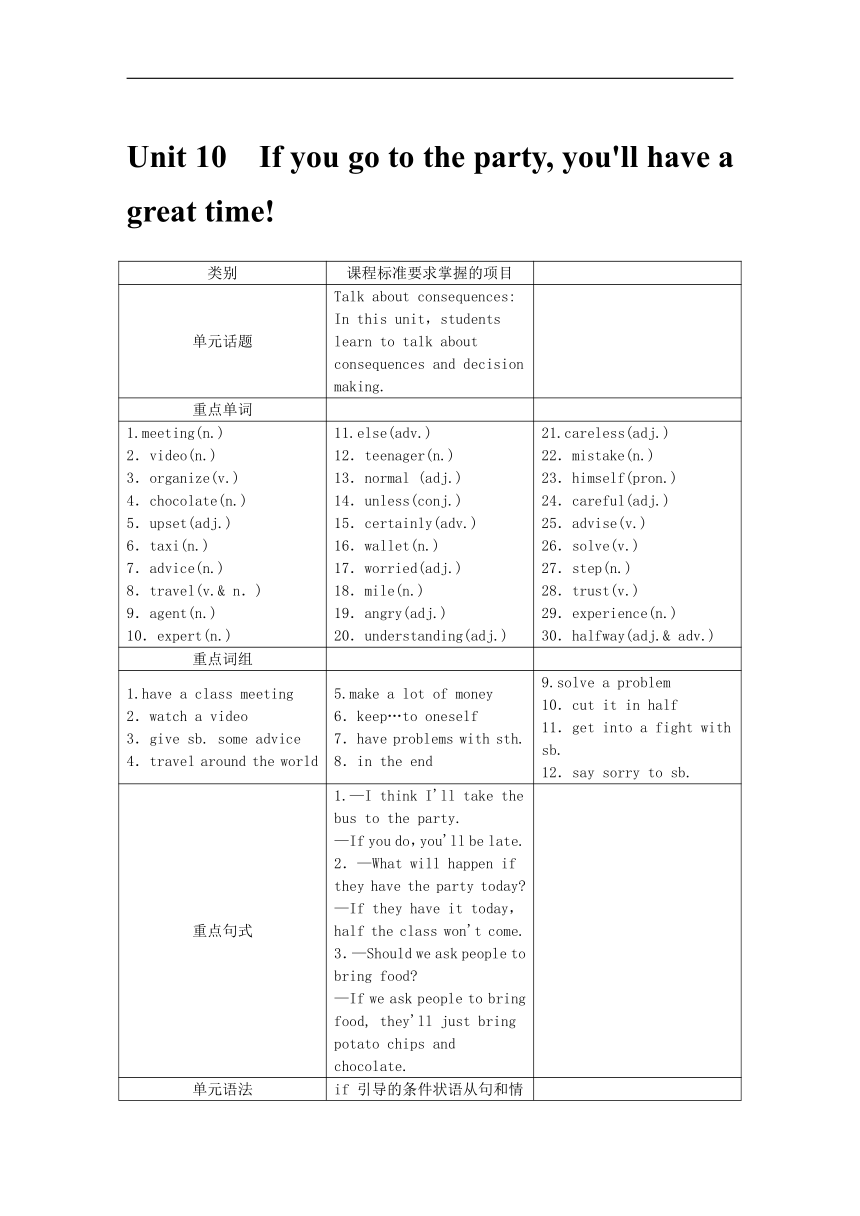
Unit 10 If you go to the party, you'll have a great time! 类别 课程标准要求掌握的项目 单元话题 Talk about consequences: In this unit,students learn to talk about consequences and decision making. 重点单词 1.meeting(n.)2.video(n.)3.organize(v.)4.chocolate(n.)5.upset(adj.)6.taxi(n.)7.advice(n.)8.travel(v.& n.)9.agent(n.)10.expert(n.) 11.else(adv.)12.teenager(n.)13.normal (adj.)14.unless(conj.)15.certainly(adv.)16.wallet(n.)17.worried(adj.)18.mile(n.)19.angry(adj.)20.understanding(adj.) 21.careless(adj.)22.mistake(n.)23.himself(pron.)24.careful(adj.)25.advise(v.)26.solve(v.)27.step(n.)28.trust(v.)29.experience(n.)30.halfway(adj.& adv.) 重点词组 1.have a class meeting2.watch a video3.give sb. some advice4.travel around the world 5.make a lot of money6.keep…to oneself7.have problems with sth.8.in the end 9.solve a problem10.cut it in half11.get into a fight with sb.12.say sorry to sb. 重点句式 1.—I think I'll take the bus to the party.—If you do,you'll be late.2.—What will happen if they have the party today —If they have it today,half the class won't come.3.—Should we ask people to bring food —If we ask people to bring food, they'll just bring potato chips and chocolate. 单元语法 if 引导的条件状语从句和情态动词 should 的用法 学情分析 本单元教学中为了使学生能正确地使用条件状语从句,教师可通过播放歌曲If you are Happy,带领学生轻松地进入本单元的学习,并有意识地感受if条件句的使用。 第一课时 Section A (1a~1c) 类别 课时要点 重点单词 1.jean(n.)牛仔裤 2.teacher(n.)老师3.party(n.)聚会 4.great(adj.)好极了 重点词组 5.take the bus to …乘坐公共汽车去…… 6.wear jeans穿牛仔7.have a great time玩得开心 8.let sb. in让某人进来 重点句式 9. If you do, the teachers won't let you in.如果你这么做,你的老师将不会让你进来。10.You can come with us if you want.如果你愿意的话,你可以跟我一起来。 §自主学习案 用所给单词的适当形式填空。 1.If you stay at home, you will_be(be) bored. 2.What will_happen (happen)if you are late for class 3.If he gets (get)up earlier, he won't be late for class. 4.If they are (be)free tomorrow, they will come to your party. 5.I think I will_become (become)a teacher in the future. §课堂导学案 Step 1 准备与热身(Preparation) The first conditional (also called conditional type 1) is a structure used for talking about possibilities in the present or in the future. This page will explain how the first conditional is formed, and when to use it. Using the first conditional The first conditional is used to talk about things which are possible in the present or the future—things which may happen: Example Explanation If it's sunny, we'll go to the park. Maybe it will be sunny—that's possible. Paula will be sad if Juan leaves. Maybe Juan will leave—that's possible. If you cook the supper,I'll-wash the dishes. Maybe you will cook thesupper—that's possible. Step 2 呈现与输入 (Presentation) On page 73 are several pictures. Look at them and match the statements with the picture (a—d) ... ...
~~ 您好,已阅读到文档的结尾了 ~~